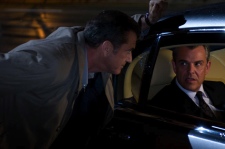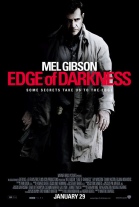Edge of Darkness
 | Edge of Darkness |
|  Edge of Darkness, which marks Mel Gibson’s return to a starring role after an eight-year absence, is based on an award-winning and much-beloved 1985 British mini-series that the film’s producers are clearly expecting audiences will not have heard of, much less seen. A specific product of 1980s Thatcherite England, the six-episode mini-series is often touted as one of the highpoints of British television--a complex, ambitious, and politically astute deconstruction of environmentalism, nuclear development, and shady government-corporate backroom dealings all rolled into the guise of a thriller. The film version, written by William Monahan (The Departed) and Andrew Bovell (Lantana) and helmed by Martin Campbell, who, interestingly enough, directed the original mini-series, unsurprisingly streamlines and simplifies the narrative, focusing it on the kind of primal, paternal rage for which Gibson is so uniquely suited. Edge of Darkness, which marks Mel Gibson’s return to a starring role after an eight-year absence, is based on an award-winning and much-beloved 1985 British mini-series that the film’s producers are clearly expecting audiences will not have heard of, much less seen. A specific product of 1980s Thatcherite England, the six-episode mini-series is often touted as one of the highpoints of British television--a complex, ambitious, and politically astute deconstruction of environmentalism, nuclear development, and shady government-corporate backroom dealings all rolled into the guise of a thriller. The film version, written by William Monahan (The Departed) and Andrew Bovell (Lantana) and helmed by Martin Campbell, who, interestingly enough, directed the original mini-series, unsurprisingly streamlines and simplifies the narrative, focusing it on the kind of primal, paternal rage for which Gibson is so uniquely suited.The story is transposed from England to Boston, where we meet the protagonist, Tom Craven (Gibson, looked lined and world-weary), a veteran police detective who is meeting his beloved twentysomething daughter Emma (Bojana Novakovic) at the train station after she decides to make a surprise visit home. She isn’t home long before her nose is bleeding, she’s vomiting, and then a mysterious hooded man blows her away with a shotgun. The police’s immediate suspicion is that Tom was the actual target and his innocent daughter got caught in the line of fire, but Tom suspects otherwise, which launches him on a single-minded mission to uncover the truth behind his daughter’s murder. His investigation into Emma’s life reveals that she was not just a mild-mannered intern at a massive nuclear research company, but rather a secret activist with an agenda who made some serious enemies. Soon, Tom is meeting with nefarious corporate tycoons (Danny Huston), corrupt Senators (Damian Young), and an ambiguous hired gun named Jedburgh (Ray Winstone) who seems to be working for the bad guys, but also seems to have a soft spot for Tom’s plight and is therefore not entirely reluctant to supply crucial information. If most of the film’s characters are scripted in glaring shades of black and white, Jedburgh occupies a strange gray zone in the middle that is as intriguing as it is confounding. While the original British mini-series gnashed a particularly sharp political agenda, the Hollywood remake steers clear of such complications in favor of more traditional thriller pleasures, especially the presence of Mel Gibson in full-on vengeance mode. He may uncover corruption that goes to the highest levels of government and international business, but it’s all in the name of avenging his daughter’s death. Despite his off-putting off-screen snafus in recent years, Gibson still knows how to command a screen, even if he’s saddled with a less-than-convincing Boston accent (if the film has a true weakness, it is its failure to bring to life the unique Beantown edginess that Ben Affleck and Clint Eastwood did so memorably in Gone Baby Gone and Mystic River, respectively). With furrowed brow and flinty eyes, Gibson does righteous anger better than just about any living actor, and Edge of Darkness thrives best when he’s pushed to the limit. There are suggestions that he may be losing his sanity, which is underlined by sequences in which he imagines holding conversations with Emma as a child (Gabrielle Popa), but at no point are we convinced that Tom is anything other than angry and determined. “I’m the guy with nothing to lose,” he declares ominously to one baddie, which is precisely what he becomes in the final moments, delivering a brutal form of audience-pleasing justice that is all but guaranteed from the opening frames. For whatever reason, we love seeing Gibson suffer, but not so much as we love watching him dispense justice. Director Martin Campbell, who last helmed the gritty James Bond reboot Casino Royale (2006), seems more than content to sacrifice substance for style, perhaps because he realized there is no way a two-hour movie could pack in the political juggling act of a six-hour mini-series. He directs the film with a minimum of fussiness, relying primarily on Gibson’s presence and the raw intensity of the story’s emphasis on loss, frustration, and corruption. Nothing is really solved by the end except that a lot of bad people get bullets in vital organs, which is probably what most audiences want to see. If the larger evil goes on thriving, at least its minions get what is coming to them. Copyright ©2010 James Kendrick Thoughts? E-mail James Kendrick All images copyright © Warner Bros. |
Overall Rating: 

 (3)
(3)

